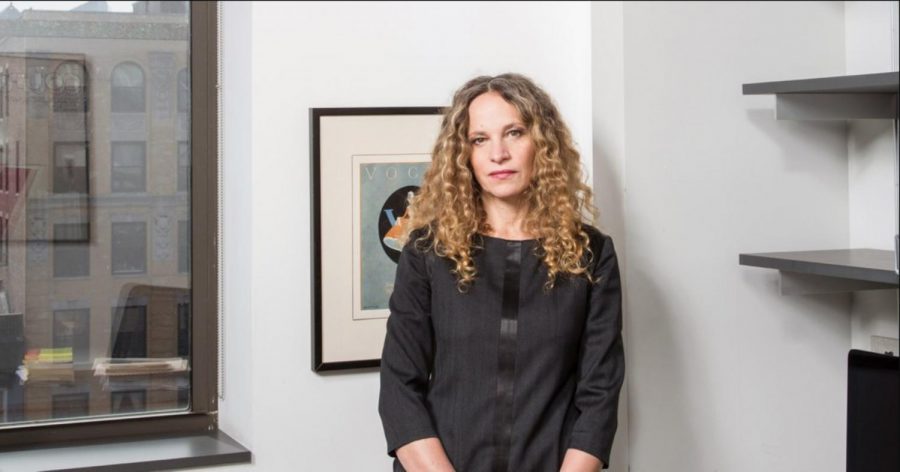#MeToo Raises Ethical Questions for NYU Journalism
Katie Roiphe is a journalism professor at NYU’s Arthur L. Carter Journalism Institute. Her part in the outing of the creator of “Shitty Media Men” is drawing attention and criticism from the NYU community and beyond.
January 29, 2018
Katie Roiphe, director of NYU’s Graduate Cultural Reporting and Criticism Program in the Arthur L. Carter Journalism Institute, allegedly planned to out the then-anonymous creator of the “Shitty Media Men” list — which drove the media industry’s response to the #MeToo movement — in a still-unpublished Harper’s Magazine piece. She also possibly lied to The New York Times about her own knowledge of the creator’s identity.
Ted Conover, the head of NYU’s graduate Journalism program, said in an email to WSN that he has received “several” emails regarding Roiphe since Jan. 9 when knowledge of her unpublished Harper’s Magazine piece became known on Twitter. According to an email from Roiphe, NYU Journalism may host an event in March in which she would have the opportunity to answer questions about her article in Harper’s Magazine. Roiphe said the article may be published in early February.
Roiphe declined to provide further information about the possible event. When asked about the event, Conover said, “I know that there might be an event, but I don’t know details.”
The “Shitty Media Men” List was an open-sourced Google Sheet anonymously published on Oct. 11 and taken down after 12 hours. Several men on the list lost their jobs due to inappropriate conduct in the weeks following the list’s publication, but it’s unclear what role, if any, the list played in these decisions. The list also prompted dozens of written responses in October. Some praised the list’s goal of believing and protecting sexually victimized women, while others criticized the list for not properly distinguishing less serious and credible claims from more serious and credible claims.
After journalists Dayna Tortorici and Nicole Cliffe tweeted that Roiphe planned to out the then-anonymous creator of the list on Jan. 9, some writers argued that Roiphe was not an appropriate voice to speak about the list and they criticised her for skepticism toward sexual assault and sexual harassment allegations.
On Jan. 10, the day after news of Roiphe’s unpublished story broke, the creator of the “Shitty Media Men” list identified herself as Moira Donegan in a widely shared piece for The Cut. Donegan wrote that Roiphe contacted her for an article about the “feminist movement,” and Donegan declined to comment. Weeks later, Donegan said that a fact-checker for Roiphe emailed her and characterized Roiphe’s article differently.
“‘Katie identifies you as a woman widely believed to be one of the creators of the Shitty Men in Media List,’” Donegan said that the fact checker wrote. “‘Were you involved in creating the list? If not, how would you respond to this allegation?’”
According to The New York Times, Roiphe claimed to not know the identity of the list creator on the same day that Donegan’s piece was published and added that she would not have identified the creator without her permission.
Several tweets claimed that Roiphe violated ethical norms within journalism by possibly lying to The New York Times about knowing that Donegan created the list and by allegedly not planning to minimize harm to her subject by publishing her name.
The NYU Journalism Ethics Handbook, which all NYU Journalism students must pledge to respect, does not mention minimizing harm to a story subject or being a source for another publication. However, the handbook does have a section dedicated to the privacy of a story’s subjects.
“The NYU Journalism Department faculty believes that privacy should never be taken lightly and recommends that student reporters not inquire into sources’ personal lives unless doing so is relevant to the story they are researching,” the handbook reads.
The handbook also instructs students to “avoid using unidentified sources whenever possible.” But Donegan allegedly declined to provide Roiphe with information for her story, meaning Donegan did not fit NYU Journalism’s definition of a source in early January.
When asked if the emails sent to NYU Journalism referred to the possible message of Roiphe’s article, what is known about the reporting process for Roiphe’s article, or both, Conover said, “They were concerned about different aspects of the conversation.”
Carrie Courogen, an associate editor for The Scene and an alumna of NYU’s undergraduate Journalism program, emailed Conover regarding Roiphe on Jan. 11. Courogen told WSN on the phone that she hoped the email would encourage NYU Journalism to reconsider Roiphe’s curriculum and employment status.
“The ethics that were involved in the whole Harper’s case and in the potential doxxing of a fellow journalist extremely concerned me,” Courogen said. “Thinking that that’s okay is a problem and somebody who has that leniency toward ethics shouldn’t be a tenured professor, in my personal opinion, shaping emerging journalists.”
Conover’s response to Courogen, which was obtained by WSN, promised to share Courogen’s concerns with the NYU Journalism faculty.
“Thank you for carefully articulating your thoughts about the current situation, thank you for caring about NYU Journalism,” Conover wrote to Courogen on Jan. 11. “We take alumni concerns seriously, and I will share with colleagues what you have shared with me.”
On Twitter, Courogen urged other graduates of NYU’s Journalism School to send emails regarding Roiphe.
Meanwhile, NYU Journalism alumnus Orli Van Mourik said on the phone that there is not enough information about Roiphe’s reporting or her unpublished article to warrant sending an email to Conover.
“There is a lot of protective fever about the author of the Shitty Media Men List, justifiably, but the people are sort of looking to scapegoat and place blame before they have incontrovertible evidence of wrongdoing,” Van Mourik said. “If we are starting to try and impose sanctions on professors for voicing unpopular opinions, even in advance of the publication of the article, then we’re certainly in pretty dangerous territory as journalists.”
Danielle Tcholakian, a freelance journalist who did not attend NYU, emailed Conover regarding Roiphe on Jan. 11. Tcholakian is a professor of journalism at The New School, but told WSN on the phone that her email to Conover represented her personal views and not those of The New School.
Tcholakian said that by emailing Conover, she hoped to learn more about NYU Journalism’s ethics policies, and increase the context for an article she had already written for LongReads, which criticized Roiphe’s reporting and anticipated criticism of the “Shitty Media Men” List.
“It seems unconventional, at the very least, to be intentionally misleading when contacting a subject who is considered a whistleblower, expose her and leave your fact-checker to ask the real questions,” Tcholakian wrote to Conover on Jan. 11. “Obviously this industry is complicated in that we don’t have standardized industry-wide ethics, but I’m curious as to whether the journalism program at NYU does?”
Tcholakian published Conover’s response to her email on Twitter four days after sending her original email. Conover referred Tcholakian to Andrew Sullivan’s column in The Intelligencer, which urged caution toward allegations and skepticism toward women associated with the #MeToo movement.
“There are ethical considerations galore in this matter,” Conover wrote to Tcholakian. “I’m sure they will be discussed in detail in our NYU Journalism classrooms this coming semester.”
Conover did not specify whether NYU Journalism professors were encouraged to address the ethical aspects of Roiphe’s article inside their classrooms. However, Conover said that he has replied to each email that he has received regarding Roiphe.
“My main thought is that everyone should wait to read professor Roiphe’s piece before forming an opinion about it,” Conover said. “I have shared the gist of the [email] comments with many of my colleagues in journalism and no doubt will share more at our next faculty meeting.”
Update Jan. 29: This article was updated to include a comment from Ted Conover regarding the possible NYU event with Roiphe in March.
Correction Jan. 30: This article was updated to include an excerpt from the Ethics Handbook about source privacy. A pervious version of this article stated that NYU Journalism faculty must pledge to abide by the Ethics Handbook. They do not.
Additional reporting by Sarah Jackson.
A version of this article appeared in the Monday, Jan. 29 print edition. Email Caroline Haskins at [email protected].


























































































































































